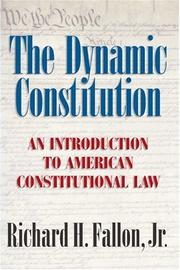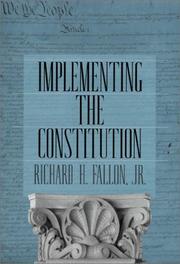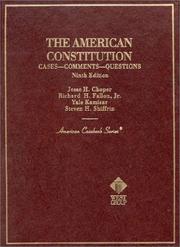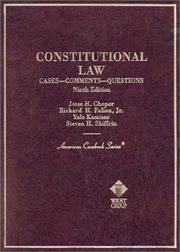| Listing 1 - 9 of 9 |
Sort by
|

ISBN: 0521600782 0521840945 1107162912 0511231067 0511231814 0511316909 0511511108 1280702389 0511229453 051123029X 9780511231063 9780511231810 0511227752 9780511227752 9780511229459 9780511230295 9780511511103 9780521840941 9781280702389 9781107162914 9780511316906 9780521600781 Year: 2004 Publisher: Cambridge [etc.] Cambridge University Press
Abstract | Keywords | Export | Availability | Bookmark
 Loading...
Loading...Choose an application
- Reference Manager
- EndNote
- RefWorks (Direct export to RefWorks)
In this 2004 book Harvard law professor Richard H. Fallon introduces non-lawyers to the workings of American constitutional law. He writes with clarity and vigor about leading constitutional doctrines and issues, including the freedom of speech, the freedom of religion, the guarantee of equal protection, rights to fair procedures and rights to privacy and sexual autonomy. Along the way, Fallon describes many of the fascinating cases and personalities that have shaped constitutional law. He shows how historical, cultural and other factors have influenced constitutional adjudication, making clear the dynamic nature of the Constitution. For both the courts and the American people, Fallon argues, the Constitution must serve as a dynamic document that adapts to the changing conditions inherent in human affairs. Fallon goes on to defend dynamic constitutionalism by confronting head on the concerns that some critics have raised.
Constitutional law --- United States --- Law --- General and Others
Book
ISBN: 9780674975811 0674975812 0674986091 0674986113 Year: 2018 Publisher: Cambridge (Mass.): Harvard university press,
Abstract | Keywords | Export | Availability | Bookmark
 Loading...
Loading...Choose an application
- Reference Manager
- EndNote
- RefWorks (Direct export to RefWorks)
Why do self-proclaimed constitutional “originalists” so regularly reach decisions with a politically conservative valence? Do “living constitutionalists” claim a license to reach whatever results they prefer, without regard to the Constitution’s language and history? In confronting these questions, Richard H. Fallon reframes and ultimately transcends familiar debates about constitutional law, constitutional theory, and judicial legitimacy. Drawing from ideas in legal scholarship, philosophy, and political science, Fallon presents a theory of judicial legitimacy based on an ideal of good faith in constitutional argumentation. Good faith demands that the Justices base their decisions only on legal arguments that they genuinely believe to be valid and are prepared to apply to similar future cases. Originalists are correct about this much. But good faith does not forbid the Justices to refine and adjust their interpretive theories in response to the novel challenges that new cases present. Fallon argues that theories of constitutional interpretation should be works in progress, not rigid formulas laid down in advance of the unforeseeable challenges that life and experience generate. Law and Legitimacy in the Supreme Court offers theories of constitutional law and judicial legitimacy that accept many tenets of legal realism but reject its corrosive cynicism. Fallon’s account both illuminates current practice and prescribes urgently needed responses to a legitimacy crisis in which the Supreme Court is increasingly enmeshed.
Political questions and judicial power --- Judicial process --- Constitutional law --- United States. --- Politique et pouvoir judiciaire --- Processus judiciaire --- Droit constitutionnel --- États-Unis. --- Political questions and judicial power - United States. --- Judicial process - United States. --- Constitutional law - United States. --- Etats-Unis --- Cynical realism (Law)
Book
ISBN: 1139610570 110723574X 1139621734 110725549X 1139612433 1139625454 1139616153 1139108867 9781139625456 9781107021402 1107021405 9781107642577 1107642574 9781139108867 Year: 2013 Publisher: Cambridge : Cambridge University Press,
Abstract | Keywords | Export | Availability | Bookmark
 Loading...
Loading...Choose an application
- Reference Manager
- EndNote
- RefWorks (Direct export to RefWorks)
In this revised and updated second edition of The Dynamic Constitution, Richard H. Fallon, Jr provides an engaging, sophisticated introduction to American constitutional law. Suitable for lawyers and non-lawyers alike, this book discusses contemporary constitutional doctrine involving such issues as freedom of speech, freedom of religion, rights to privacy and sexual autonomy, the death penalty, and the powers of Congress. Through examples of Supreme Court cases and portraits of past and present Justices, this book dramatizes the historical and cultural factors that have shaped constitutional law. The Dynamic Constitution, 2nd edition, combines detailed explication of current doctrine with insightful analysis of the political culture and theoretical debates in which constitutional practice is situated. Professor Fallon uses insights from political science to explain some aspects of constitutional evolution and emphasizes features of the judicial process that distinguish constitutional law from ordinary politics.
Constitutional law --- Law --- General and Others
Book
ISBN: 1108673546 1108651879 1108758770 1108483267 1108703917 9781108651875 9781108758772 9781108673549 Year: 2019 Publisher: Cambridge, England : Cambridge University Press,
Abstract | Keywords | Export | Availability | Bookmark
 Loading...
Loading...Choose an application
- Reference Manager
- EndNote
- RefWorks (Direct export to RefWorks)
What does it mean to have a constitutional right in an era in which most rights must yield to 'compelling governmental interests'? After recounting the little-known history of the invention of the compelling-interest formula during the 1960s, The Nature of Constitutional Rights examines what must be true about constitutional rights for them to be identified and enforced via 'strict scrutiny' and other, similar, judge-crafted tests. The book's answers not only enrich philosophical understanding of the concept of a 'right', but also produce important practical payoffs. Its insights should affect how courts decide cases and how citizens should think about the judicial role. Contributing to the conversation between originalists and legal realists, Richard H. Fallon, Jr explains what constitutional rights are, what courts must do to identify them, and why the protections that they afford are more limited than most people think.

ISBN: 0674004647 9780674004641 Year: 2001 Publisher: Cambridge, Mass. Harvard University Press
Abstract | Keywords | Export | Availability | Bookmark
 Loading...
Loading...Choose an application
- Reference Manager
- EndNote
- RefWorks (Direct export to RefWorks)
Book
ISBN: 0674986091 0674986113 Year: 2018 Publisher: Cambridge, MA : Harvard University Press,
Abstract | Keywords | Export | Availability | Bookmark
 Loading...
Loading...Choose an application
- Reference Manager
- EndNote
- RefWorks (Direct export to RefWorks)
"The book addresses questions about the roles of law and politics and the challenge of legitimacy in constitutional adjudication in the Supreme Court. With all sophisticated observers recognizing that the Justices' political outlooks influence their decision making, many political scientists, some of the public, and a few prominent judges have become Cynical Realists. In their view Justices vote based on their policy preferences, and legal reasoning is mere window-dressing. This book rejects Cynical Realism, but without denying many Realist insights. It explains the limits of language and history in resolving contentious constitutional issues. To rescue the notion that the Constitution is law that binds the Justices, the book provides an original account of what law is and means in the Supreme Court. It also offers a theory of legitimacy in Supreme Court adjudication. Given the nature of law in the Supreme Court, we need to accept and learn to respect reasonable disagreement about many constitutional issues. If so, the legitimacy question becomes: how would the Justices need to decide cases so that even those who disagree with the outcomes ought to respect the Justices' processes of decision? The book gives a fresh and counterintuitive answer to that vital question. Adapting a methodology made famous by John Rawls, it argues that the Justices should strive to achieve a "reflective equilibrium" between their interpretive principles, framed to identify the Constitution's enduring meaning, and their judgments about appropriate outcomes in particular cases, evaluated as prescriptions for the nation to live by in the future. The book blends the perspectives of law, philosophy, and political science to answer theoretical and practical questions of pressing national importance"--
Political questions and judicial power --- Judicial process --- Constitutional law --- Cynical realism (Law) --- United States.
Book
ISBN: 067441926X 0674419278 Year: 2001 Publisher: Harvard University Press
Abstract | Keywords | Export | Availability | Bookmark
 Loading...
Loading...Choose an application
- Reference Manager
- EndNote
- RefWorks (Direct export to RefWorks)

ISBN: 0314247173 Year: 2001 Publisher: St. Paul (Minn.) : West,
Abstract | Keywords | Export | Availability | Bookmark
 Loading...
Loading...Choose an application
- Reference Manager
- EndNote
- RefWorks (Direct export to RefWorks)

ISBN: 0314247165 Year: 2004 Publisher: St. Paul, Minn. Thomson West
Abstract | Keywords | Export | Availability | Bookmark
 Loading...
Loading...Choose an application
- Reference Manager
- EndNote
- RefWorks (Direct export to RefWorks)
| Listing 1 - 9 of 9 |
Sort by
|

 Search
Search Feedback
Feedback About UniCat
About UniCat  Help
Help News
News